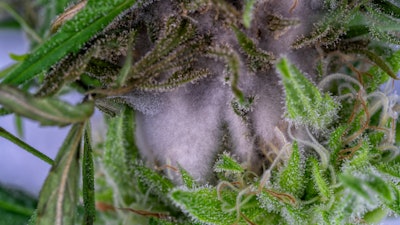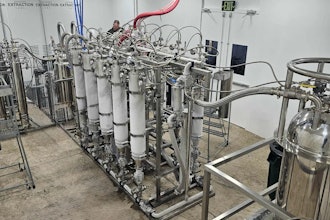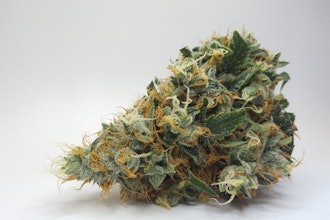
The Oregon Liquor and Cannabis Commission (OLCC) last week notified nearly 3,000 recreational marijuana licensees that detections of Aspergillus mold in cannabis products would no longer prevent the sale or transfer of such products.
The Oregon Health Authority (OHA) was forced by a state court order to pass a temporary rule removing the previous requirement for all cannabis products to pass testing for four types of Aspergillus mold.
While the trial's next phase, challenging the rule, continues, the OHA can't enforce previous Aspergillus testing requirements. So, some 2,500 pounds of cannabis and 65,000 units of infused pre-rolls that tested positive for Aspergillus mold may now be sold or transferred to other licensees or consumers.
According to Joel Noble, microbiology technical director at Rose City Laboratories in Portland, Oregon, most failed tests came from outdoor growers and infused pre-roll products. He says higher than normal fail rates, likely from climate differences or remediation inexperience, combined with a generally struggling market, placed too much strain on the industry and led to the testing requirement backlash.
While cannabis growers in the state are now apparently free from testing cannabis products for Aspergillus, the move could put consumers at risk. Growers can decontaminate or remediate the product, but they could also sell products to dispensaries as is. According to Alex Rubin, regulatory analyst at compliance platform Simplifya, the news is worrisome from a consumer perspective. "How much mold is in these products, and are they safe to consume?" he asks.
Contaminated cannabis is particularly dangerous for the immunocompromised.
"What's happening in Oregon is setting a dangerous precedent," said Milan Patel, CEO and co-founder of testing kit manufacturer PathogenDx. "This rule change allows contaminated products to end up in the hands of consumers, as well as medical patients who may be more susceptible to disease, and for whom the consequences of consuming contaminated cannabis could be dire."
Pathogens pose a risk for any immunocompromised or immunosuppressed cannabis user. While loosening testing regulations may save companies some money in the short term, Patel says relaxing the regulatory environment will carry significant long-term economic repercussions, as well as damage to the entire industry and, most importantly, potential injury or death to consumers.
Rubin says the OHA has a few options, but the likely best option would be working with cannabis industry operators to craft a new, softer form of Aspergillus regulation and allow both sides to move on from this particular legal case.
"Many other states require Aspergillus testing, and the level is 'not detected in one gram," Rubin says. Oregon has similar language for E. coli and Salmonella. The FDA also has action limits which are above zero on the amount of aflatoxins in food, wine and tobacco before they would take legal action to remove the products from the market, according to Rubin.
"We should be testing for Aspergillus, though perhaps not in the same direct capacity as was required before," Rose City's Noble says. "A strict pass/fail for anything above 1 CFU/gram is obviously not workable for the industry." He says the state has tried other testing methods, but they lacked requisite specificity and reliability.
Patel warns of the potentially compounding effects of trace amounts of contaminants.
"Several states still allow trace amounts of Aspergillus and other pathogens to be present in the cannabis that makes its way to dispensary shelves. Those traces might appear inconsequential right now, but what happens to frequent consumers who have been saturating their lungs with these pathogens for 20 years?" Patel asks. "There is a documented history of fungal infections related to cannabis consumption, and consumers or patients with asthma, COPD and cystic fibrosis are just a subset of the population that could be at risk."
Consistently inhaling any amount of pathogen-contaminated cannabis can lead to lung issues and pulmonary disease down the road.
"As an industry, this should not be a risk we are willing to take," Patel stresses. "We need regulators and operators to step up and implement more aggressive testing procedures, not eliminate those requirements that are already in place."
Regardless of the judicial review's outcome, Aspergillus testing will be required in the future, and cultivators will need to update production practices to mitigate contamination.
As Rubin stresses, cannabis is susceptible to microbial contamination at nearly every point in the supply chain. Infection can begin while the plant is alive but is particularly vulnerable during harvest, storage and curing.
Testing for moisture content and water activity can assess the risk of microbial growth, and environmental monitoring of testing conducted at multiple stages in the supply chain, rather than just final cured sampling submitted to the laboratory for testing, could be beneficial to catching Aspergillus contamination.
Cannabis Equipment News did reach out to the OLCC, but the commission did not respond to our request for comment.























